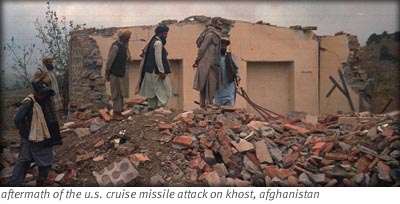|
As early as August 12--five days after the embassy bombings--sources say a
"small group" of foreign policy advisors met with President Clinton to let him
know they believed Osama bin Laden was behind the bombings. (Early breaks in
the case had led to the quick arrests of two men who linked the attacks to
bin Laden.)
The "small group" consisted of the National Security Advisor Sandy Berger;
Secretary of State Madeleine Albright; Secretary of Defense William Cohen;
Director of the CIA George Tenet; Chairman of the Joint Chiefs of Staff General
Henry Shelton; and a high-ranking staff member, counter-terrorism czar Dick
Clarke.
"So these six very powerful people--the President, the head of the Pentagon,
the head of the NSC, the head of the CIA, the head of the State Department and
the Chairman of the Joint Chiefs have got a real dilemma," says Tim Weiner,
New York Times reporter. "They want to strike back, but where? Where
can you hurt him? Where can you take him down? Where can you do him damage?
The problem is, they may not have struck him where it hurt the most."
In the past, the U.S. has taken a law enforcement stance to terrorist attacks:
the FBI attempts to uncover who was responsible and bring them to trial in the
U.S. The attack on the U.S. embassies, however, was deemed an act of war
against the U.S. The advisory group discussed a military response and it was
recommended that the U.S. attack bin Laden's network and attempt to destroy his
base of operations.
The advisors had a list of potential targets that had been developed by the CIA
over many months of investigating bin Laden and his terrorist network, "Al Qaeda." They eventually decided on two sites:
1) the camps in Afghanistan which they believed would be the site of a large
meeting of terrorist leaders later that month; and
2) a pharmaceutical factory in the Sudan where they believed bin Laden's
network had been producing chemical weapons.

In Afghanistan, approximately 70 cruise missiles hit three alleged bin Laden
training camps. An estimated 24 people were killed. But if they wanted to
kill bin Laden, they failed. Bin Laden was not at the camps when the bombs
hit. In the Sudan, approximately 13 cruise missiles hit a pharmaceutical
plant. The night watchman was killed.
Days later, in the streets of Khartoum, Sudanese President al-Bashir led an
anti-US march. Suddenly it seemed America was transformed from a victim of
terrorism to an aggressor nation. And in the days following the bombing, the
President's National Security Advisor Samuel Berger faced a barrage of
questions--especially on the Sudan attack. Reports quickly circulated that the
Sudanese missile strike had hit a working pharmaceutical plant with no
easily-proven link to bin Laden.
FRONTLINE questioned National Security Advisor Sandy Berger about the attacks
and he claimed they were justified. "Well, I believe we had solid knowledge
that this facility was associated with chemical weapons," said Berger. But on
the day immediately following the missile strike, Berger had said that the
camp was "producing chemical weapons." Berger and others had backed away from
their initial assertions about the camp as more evidence emerged.
To help sort out what had happened, FRONTLINE brought Milt Bearden to the
Sudan. Besides coordinating the CIA's covert aid program to rebels in the
Afghan war, Bearden was CIA station chief in Sudan during the mid-eighties. He
has been critical of the missile strikes against bin Laden.
"Last August 20, we struck with missiles two Islamic states--one totally failed
state, Afghanistan, and a nearly [failed state], the Sudan," said Bearden.
"My reaction is, 'Dear God, what do they know? What is this about?'"
On the day of the missile strikes, Clinton administration officials also made
other statements about the Sudan pharmaceutical plant which since have been
disproven. For instance, despite U.S. claims that the factory was not making
pharmaceuticals, it's now known this is not true. (FRONTLINE learned that the
U.S. conducted an internet search on the plant and used that as the basis for
evidence that the plant was not producing pharmaceuticals.)
And, if the factory was ever producing any nerve gas-related chemicals, the
evidence has been less than convincing. There are two major problems with the
U.S. government's case. First, a test on a soil sample that the administration
says proves that the plant was involved in chemical weapons production is,
according to many experts, inconclusive. The chemical which was found, Empta,
is a precursor to create nerve gas. But, experts say, Empta breaks down
quickly and can be confused with other less harmful chemicals. Despite
repeated tests by others, including lawyers for the plant owner, there have
been no independent confirmations of the U.S. government's soil test.
Secondly, the Clinton administration has failed to demonstrate a solid
financial link between the plant and bin Laden. They initially claimed that
the plant was owned by the Sudanese Military Industrial Corporation, yet the
plant had actually been sold to a Saudi millionaire, Saleh Idris, several
months before the attack. The private investigative firm of Kroll and
Associates has found no solid financial link between bin Laden and Idris.
Bearden believes the U.S. government needs to come forward and prove to people
that their intelligence was accurate. "Look, if you've got intelligence
sources that matters to protect, don't worry about it. Bite the bullet, lay
the intelligence on the table," he says. "If you've got to move somebody up
for safety, do that, but lay it on the table now. Let us see it. This is not
going to go away. The doubts are not just lingering, they're growing."
Sudanese officials told FRONTLINE that they would welcome a chemical weapons
inspection team from the United Nations, to prove they are not involved in
chemical weapons production. And yet, despite the Sudanese claims of
willingness to cooperate, it is troubling that Sudan has refused to sign the
United Nation's chemical weapons treaty.
 |